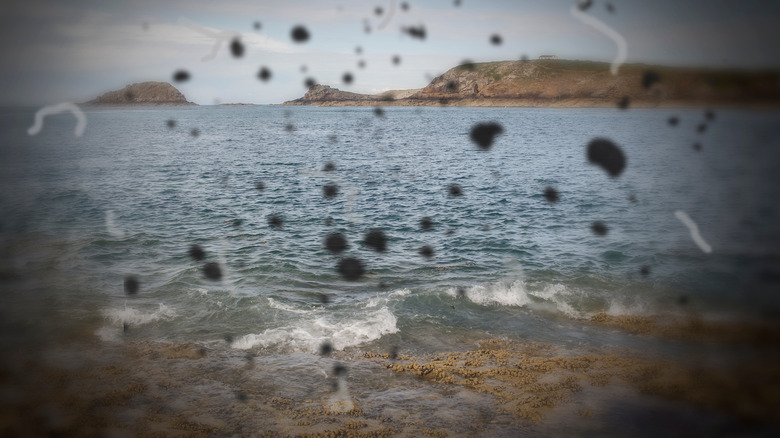Seeing Spots Could Be A Sign Of This Deficiency
There are so many amazing things that you can see with your eyes, but if you start seeing spots you may feel alarmed. While most people see spots on occasion, like right after staring at a bright light, seeing spots regularly may be a sign of an underlying condition. Mayo Clinic reports that the official term for seeing spots is eye floaters, and they can take on the appearance of blurry specks, lines, or cobweb shapes that are black or gray in color. If you see these specks or cobweb shapes and they seem to dart away when you try to stare straight at them, then you likely have eye floaters.
Eye floaters can be a result of common aging-related eye changes, according to WebMD. However, eye floaters can also be caused by trauma to the eye or a neurological condition. In most cases, eye floaters are composed of collagen, a protein found in the body. If they become bothersome, experts recommend moving your eyes up and down so the fluid moves around. In case that doesn't work, you may require surgery. Sometimes floaters can be caused by a vitamin deficiency and serve as an indication that your body isn't getting the amount of essential nutrients it needs to thrive, as per LiveStrong.
Vitamin deficiencies that can cause eye floaters
There are several vitamin deficiencies that can have eye floaters as a possible side effect, like deficiencies in vitamin A, C, and riboflavin (via LiveStrong). Vitamin A is critical to keeping the tissue within our eyes healthy, so if you aren't getting enough vitamin A then your eyesight may be negatively affected. Harvard Health Publishing recommends eating vegetables, fish oils, tomatoes, red bell peppers, cantaloupes, and mangoes for a diet packed with vitamin A.
Both vitamin C and riboflavin can help protect your eyes against developing cataracts, so they're both essential in maintaining eye health (per LiveStrong). If you don't get enough of either vitamin, you may begin to see spots as an early sign of cataracts. Vitamin C is important for maintaining immunity and plays a key role in healing wounds, says WebMD. To make certain that you're getting enough vitamin C in your diet, try to add foods like kiwi, cantaloupe, red bell peppers, red cabbage, and broccoli. The best part is that many foods high in vitamin A are also rich in vitamin C, so it's a two-for-one. If you suspect that a vitamin deficiency is behind the reason you're seeing spots, never attempt to treat it yourself by taking supplements. It's always best to make an appointment with a healthcare practitioner who specializes in the retina to determine if a vitamin deficiency is in fact behind the eye floaters or if there's another underlying condition.


